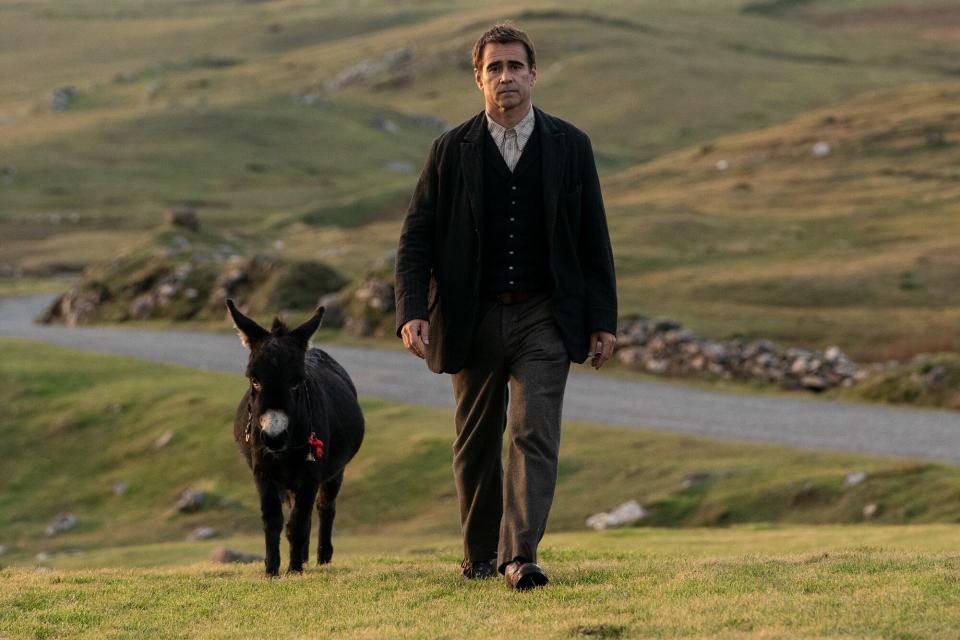The Banshees of Inisherin review: A friendship turns into a feud overnight
- Oops!Something went wrong.Please try again later.
- Oops!Something went wrong.Please try again later.
- Oops!Something went wrong.Please try again later.
It's been nearly 15 years since Martin McDonagh made his feature directorial debut with In Bruges, a neat, nasty little gem of a movie about two bungling hitmen (Colin Farrell and Brendan Gleeson) on the lam — and not doing it well — in Belgium. The Banshees of Inisherin reunites him with his two leading men in a film that turns out to be pretty much the furthest thing from a sequel to Bruges, but still feels like a kind of homecoming nonetheless. And a testament, too, to how they've each evolved as artists: A prolific playwright whose last screen outing, Three Billboards Outside Ebbing, Missouri, won Oscars for both Frances McDormand and Sam Rockwell, McDonagh has always been known for his particular brand of bleak existential comedy. Tar-black, bloody, and tinged with the surreal, it can also come off as ruthless, even casually cruel. Inisherin, though, feels like his most humane and deeply felt offering to date — which says a lot about a movie rife with blasphemy, self-mutilation, and miniature donkeys — and the actors here respond accordingly with some of the richest, most fully realized performances of their careers.
It's 1923 on a small windblown island off the coast of Ireland, and Pádraic (Farrell) seems like a happy-enough creature of habit: He lives in a modest cottage with his wry, bookish sister, Siobhán (Better Call Saul's Kerry Condon), tends to a small stable of animals, and meets his best mate Colm (Gleeson) regularly for pints at the local pub. That is, until the day Colm announces that he no longer wants to get pints, ever again. Life is too short, and Pádraic is too dull; Colm would prefer to be left alone with his dog and his fiddle, and maybe write a piece of music that actually means something before he dies. This abrupt change of heart isn't just bewildering for Pádraic, it's entirely destabilizing. Who is he, if not the man who gets pints with Colm?

Jonathan Hession/Searchlight Pictures
Banshees, with its Kelly-green vistas, warbled shanties, and blithe obscenities ("feck" is a noun, an adjective, and sometimes a verb),could easily come off as the kind of Irish burlesque we've seen many times before; instead, the movie turns out to invert cliché as much as it embraces it. Inisherin may not be a hotbed for making new friends, but it's still a place rife with outsize characters: the local "idjit," Dominic (Dunkirk's puckish Barry Keoghan) and his abusive constable father (Gary Lydon); the blustery parish priest (David Pearse); an elderly neighbor so wizened and witchy she looks like she might have once shared a staff with Gandalf. Their dialogue unfurls in Mcdonagh's signature rhythms, a sort of profane poetry that skitters between farce and calamity, often within the same sentence.
The cast tasked with it is masterful, from Keoghan's holy fool to Condon's long-suffering Siobhán, a nervy, sharp-witted woman stranded in a sea of petty grievances and grown adolescents. Farrell — alternately bruised, defiant, achingly sincere, and also very funny — wears the sum of his years here with fresh significance; he's still almost obscenely handsome, but there's a depth of feeling that could only come from lived experience, and a tender, shaggy gravitas in Gleeson too. Their falling out, of course, is not just about pints, or Pádraic's little house donkey that he keeps by his side like a border collie. To be corny, which the film (due in theaters Oct. 21) is decidedly not, it's about life: the brevity of it, the risks we do or don't take, who we choose to share it with in the end. And for all the gall, absurdity, and outright threats of physical violence, it's pretty feckin' wonderful. Grade: A–
Related content:

